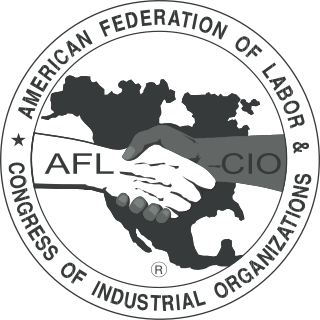Related Research Articles

The American Federation of Labor and Congress of Industrial Organizations (AFL-CIO) is a national trade union center that is the largest federation of unions in the United States. It is made up of 60 national and international unions, together representing more than 12 million active and retired workers. The AFL-CIO engages in substantial political spending and activism, typically in support of progressive and pro-labor policies.

The American Federation of Labor was a national federation of labor unions in the United States that continues today as the AFL–CIO. It was founded in Columbus, Ohio, in 1886 by an alliance of craft unions eager to provide mutual support and disappointed in the Knights of Labor. Samuel Gompers was elected the full-time president at its founding convention and was re-elected every year except one until his death in 1924. He became the major spokesperson for the union movement.
The Associated Actors and Artistes of America (4As), established in 1919, is the federation of trade unions for performing artists in the United States.

The Office and Professional Employees International Union (OPEIU) is a trade union in the United States and Canada representing approximately 88,000 white-collar working people in the public and private sectors. It has members in all 50 US states, the District of Columbia, and Puerto Rico, as well as in one local in Canada.
The American Guild of Variety Artists (AGVA) is an American entertainment union representing performers in variety entertainment, including circuses, Las Vegas showrooms and cabarets, comedy showcases, dance revues, magic shows, theme park shows, and arena and auditorium extravaganzas. There is some overlap between the jurisdictions of AGVA and Actors' Equity.
The International Brotherhood of Paper Makers (IBPM) was a labor union representing workers involved in making paper in the United States, Canada and Newfoundland.

The International Plate Printers, Die Stampers and Engravers Union of North America is a North American labor union, one of the constituent members of the Department for Professional Employees of the AFL–CIO; and of the Canadian Labour Congress, founded in 1893. It is the result of a number of mergers of labor unions, and is headquartered in Silver Spring, Maryland

The 1919 Actors' Equity Association strike officially spanned from August 7, 1919, to September 6, 1919. In the late 19th and early 20th centuries, the theatre industry was revolutionized by powerful management groups that monopolized and centralized the industry. These groups created harsh working conditions for the actors. On May 26, 1913, actors decided to unionize, and they formed the Actors' Equity Association. After many failed attempts to negotiate with the producers and managers for fair treatment and a standard contract, Equity declared a strike against the Producing Managers' Association on August 7, 1919. During the strike, the actors walked out of theaters, held parades in the streets, and performed benefit shows. Equity received support from the theatrical community, the public, and the American Federation of Labor, and on September 6, 1919, the actors won the strike. The producers signed a contract with the AEA that contained nearly all of Equity's demands. The strike was important because it expanded the definition of labor and altered perceptions about what types of careers could organize. The strike also encouraged other groups within the theatre industry to organize.
The American Federation of Hosiery Workers (AFHW) was a labor union representing workers involved in manufacturing hosiery.
The International Brotherhood of Pulp, Sulphite, and Paper Mill Workers (IBPSPMW) was a labor union representing workers involved in making paper in the United States and Canada.
The American Flint Glass Workers' Union (AFGWU) was a labor union representing workers involved in making glassware and related goods in the United States and Canada.
The International Leather Goods, Plastic and Novelty Workers' Union (ILGPNWU) was a trade union representing workers involved in making bags, belts and similar goods, in the United States and Canada.
The International Jewelry Workers' Union (IJWU) was a labor union representing workers involved in making jewelry in the United States and Canada.
The United Rubber, Cork, Linoleum and Plastic Workers of America (URW) was a labor union representing workers involved in manufacturing using specific materials, in the United States and Canada.
The International Brotherhood of Blacksmiths, Drop Forgers and Helpers (IBB&H) was a labor union representing metal workers in the United States and Canada.
The International Brotherhood of Foundry Employees (IBFE) was a labour union representing foundry workers in the United States and Canada.
The National Federation of Post Office Clerks (NFPOC) was a labor union representing clerks working in post offices in the United States.
The United National Association of Post Office Clerks (UNAPOC) was a labor union representing clerks working in the post office in the United States.
References
- 1 2 3 Reynolds, Lloyd G.; Killingsworth, Charles C. (1944). Trade Union Publications: The Official Journals, Convention Proceedings, and Constitutions of International Unions and Federations, 1850–1941. Baltimore: Johns Hopkins Press.
- ↑ Handbook of American Trade Unions (PDF). Washington, D.C.: United States Department of Labor. 1926. Retrieved 24 April 2022.
- ↑ "The Theatre: Sophie Spanked". Time. July 24, 1939. Retrieved 25 April 2015.